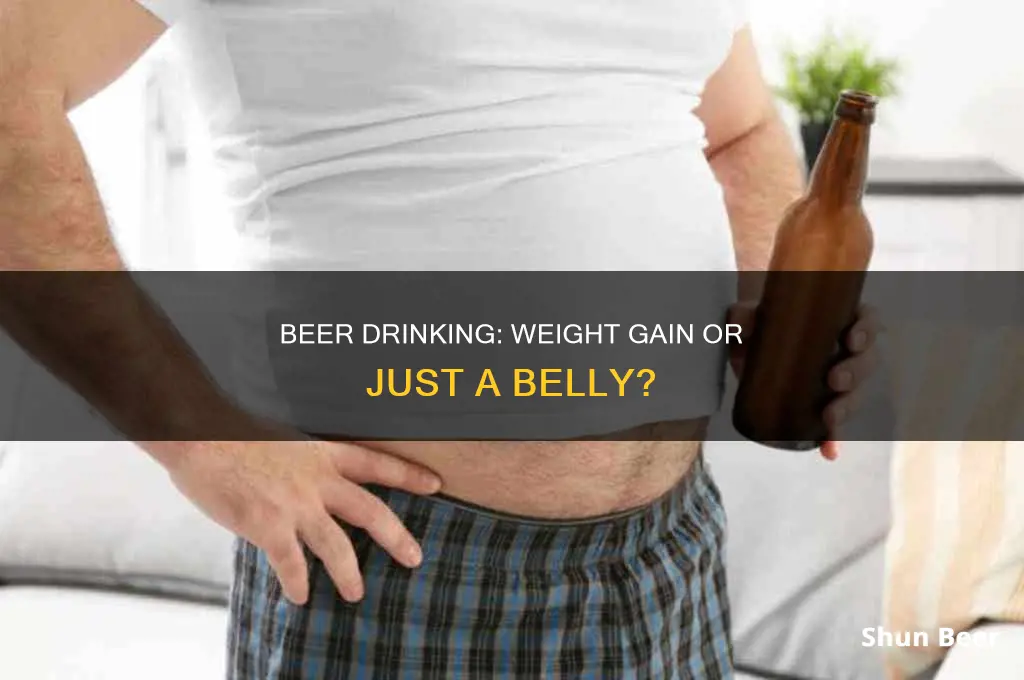
Drinking beer is often associated with weight gain, particularly around the belly—the infamous beer belly. But does beer really cause weight gain, and is it inevitable?
Beer is high in calories, with an average of 150 calories per regular-sized can or bottle, and light beers containing around 70 to 100 calories. The more alcohol a beer contains, the more calories it has. Since alcohol contains about seven calories per gram, compared to four calories per gram for carbs and protein, it's easy to see how drinking several beers can result in a significant calorie overload.
In addition to the calories in beer, alcohol also increases your appetite, making you more likely to overeat or opt for unhealthy, fattening foods. When you drink alcohol, your liver burns alcohol instead of fat, preventing your body from burning off those excess calories as fuel. This combination of increased calorie consumption and decreased fat burning means that drinking beer can indeed contribute to weight gain.
However, whether or not you will gain weight from drinking beer depends on various factors, including your unique body and lifestyle. The amount you drink, how often, and what you eat while drinking all play a role. While moderate drinking of one beer per day or less is not linked to weight gain, excessive drinking or binge drinking significantly increases the risk of gaining weight and developing a beer belly.
| Characteristics | Values |
|---|---|
| Weight gain | Beer can cause weight gain, including belly fat. |
| Calories | Beer contains calories, with an average of 150 calories per regular-sized can or bottle. |
| Appetite | Beer can increase appetite and lead to unhealthy food choices. |
| Fat burning | Beer stops the body from burning fat as the liver prioritises breaking down alcohol. |
| Health risks | Excessive drinking has health risks such as high blood pressure, heart disease, and liver disease. |
| Hormones | Beer may affect hormones that control appetite, hunger, and stress. |
| Sleep | Excessive alcohol use is linked to poor sleep quality and duration, which may contribute to weight gain. |
What You'll Learn

Beer contains lots of calories
Beer is high in "empty" calories, meaning they contain little to no beneficial nutrients or minerals. Alcoholic beverages are often high in empty calories, with about seven per gram. In contrast, carbs and protein have only four calories per gram.
Beer also gets blamed because alcohol calories are easy to overdo. Alcohol can increase your appetite, and when you're drinking beer, the food on hand is often fattening, like pizza, wings, and other fried foods.
Beer alone may not make you fat, but it has bulk, which stretches the stomach lining and contains sugar. The local loading of all that beer stretches the stomach muscles, giving the characteristic "beer belly" shape. Beer bellies tend to be more prominent in older people because, as you get older, your calorie needs decrease, you often become less active, and gaining weight gets easier.
Whisky and Beer: A Match Made in Heaven?
You may want to see also

Alcohol stops your body from burning fat
Alcohol can indeed stop your body from burning fat, but it's not inevitable that you will gain weight from drinking it. It depends on many factors, such as what and how much you drink, how often, what you eat when drinking, and your body and lifestyle.
When you drink alcohol, your body prioritises metabolising it over other metabolic pathways. This is because your body considers ethanol, the organic compound produced during fermentation, a toxin or waste product. The liver turns ethanol into acetaldehyde, which is toxic and carcinogenic. The body then works to get rid of the acetaldehyde by turning it into acetate, a less active byproduct that becomes carbon dioxide and water, which the body can easily eliminate.
While the body is focused on metabolising alcohol, any other calories consumed are put on hold. Additionally, drinking alcohol can increase your appetite and lead to cravings for salty, greasy, and sugary foods. This can result in excess calorie consumption, which, if not balanced by physical activity, can lead to weight gain.
The more alcohol you consume, the longer it takes for your body to metabolise it. On average, it takes the body around 25 hours to metabolise alcohol, but it can take up to 36 hours, depending on the dose and the individual. During this time, your body's ability to burn fat is impaired.
While there is no definitive link between alcohol consumption and weight gain, heavy drinking can lead to weight gain and mitigate weight loss. Regularly drinking more than 17 ounces (500 milliliters) of beer per day has been associated with an increased risk of weight gain, particularly around the belly, also known as a "beer belly."
Beer and an Upset Stomach: Should You Drink or Not?
You may want to see also

Beer increases your appetite
Beer is also high in calories, and it is easy to consume a lot of calories from beer very quickly. A typical beer contains around 150 calories, and if you drink several in one sitting, you can quickly exceed your daily calorie allowance.
In addition, the food that is often consumed alongside beer, such as pizza, wings, and other fried foods, tends to be high in calories and fat.
Finally, beer contains sugar, which can provide energy for your body, causing it to store any fat consumed rather than burning it for energy.
For these reasons, beer can increase your appetite and contribute to weight gain, particularly around the belly, which is often referred to as a "beer belly."
Beer Gas: How Does It Work?
You may want to see also

Beer is linked to abdominal weight gain
Drinking alcohol can prevent your body from burning fat. This is because your body prioritises breaking down alcohol over other sources of fuel, including stored fat. When you drink beer, about 20% of the alcohol enters your bloodstream, eventually reaching your liver, where it is metabolised. Once your brain detects the byproducts of that metabolism, it stops burning fat and concentrates on ridding the body of these byproducts.
Beer is also associated with abdominal weight gain because it increases your calorie intake. Gram for gram, beer contains as many calories as a soft drink, so it has the potential to add a lot of calories to your diet. Beer may also prevent fat burning because your body prioritises the breakdown of alcohol over other sources of fuel, including stored fat.
In addition, drinking alcohol can increase your appetite in the short term, causing you to eat more than you otherwise would. When drinking beer, the food on hand is often fattening, such as pizza, wings, and other fried foods.
Finally, beer contains phytoestrogens, plant compounds that can mimic the action of the female sex hormone oestrogen in the body. Beer may, therefore, cause hormonal changes in men that increase the risk of storing belly fat.
Tequila and Beer: Mixing Alcohol Safely
You may want to see also

Beer is high in empty calories
Cocktails and mixed drinks tend to have more calories than beer and wine. For example, a piña colada has as many as 500 calories per seven-ounce serving.
Beer also gets blamed for weight gain because alcohol calories are easy to overdo. If you down several in one sitting, you can end up with a serious calorie overload. Beer lovers should opt for light beers with 100 calories or fewer, and limit the number they drink per day.
Beer is also associated with weight gain because it increases your appetite. When drinking beer, it's common to eat fatty foods like pizza, wings, and other fried foods.
The biggest problem with any alcoholic beverage is when and what you consume with them. Your body will naturally burn alcohol before burning either fat or glycogen. Most people drink in the evenings when the body doesn't have the opportunity to burn off all those empty calories.
Beer and Pre-Workout: A Safe Combo?
You may want to see also
Frequently asked questions
Yes, drinking beer can cause weight gain. Beer is high in calories and can affect hormones that control appetite, hunger, and stress. Beer also stops your body from burning fat.
Beer contains a high number of calories, with an average of 150 calories per regular-sized can or bottle. It also affects your hormones, increasing your appetite and making you feel hungrier. Additionally, when you drink alcohol, your liver prioritizes breaking down alcohol instead of burning fat.
According to the National Institute on Alcohol Abuse and Alcoholism (NIAAA), heavy drinking is defined as more than three drinks per day or seven drinks per week for females, and more than four drinks per day or 14 drinks per week for males.
Yes, the food you eat while drinking beer can also contribute to weight gain. Beer is often consumed with fatty foods like pizza, wings, and other fried foods. Additionally, drinking beer can lead to cravings for salty and greasy foods.
Yes, drinking alcohol, especially in excessive amounts, can have serious health risks, including high blood pressure, insulin resistance, heart disease, stroke, liver disease, and an increased risk of certain cancers.







